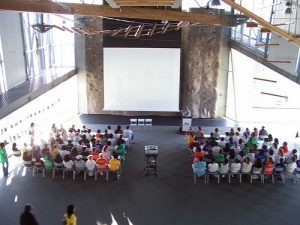 Creating a culture where social justice and liberation is the norm requires education, but we know that mere memorization of facts will not get us there. This new creation requires us to learn new skills and adapt to a new way of seeing the world and the people around us. Anti-oppression movements and the rise of popular education have provided the insight and tools necessary to educate ourselves and each other so that we can attain this culture of liberation in the most direct way possible.
Creating a culture where social justice and liberation is the norm requires education, but we know that mere memorization of facts will not get us there. This new creation requires us to learn new skills and adapt to a new way of seeing the world and the people around us. Anti-oppression movements and the rise of popular education have provided the insight and tools necessary to educate ourselves and each other so that we can attain this culture of liberation in the most direct way possible.
Our method of education is multicultural and integrates perspectives developed during movements against sexism, racism and other forms of oppression. We don’t compartmentalize ‘‘diversity work,’’ instead merging all anti-oppression work into our method and into the very framework of the learning itself.
The MSPJC firmly believes the best way to educate ourselves and our community is to move away from a “fact-centered” model and move instead toward a “people-centered” model of education. We know that the people we work with are the experts. They know more about what’s happening in their communities than anyone else, and they know the best ways to go about creating solutions to the challenges they face. We also know our communities have the power to create change; that we can’t and shouldn’t wait for someone from above to fix us; that real and lasting change happens from the ground up.
The role of the educator is not to cite facts and figures but to facilitate people‘s recognition of what they already know. In this model, the starting point is not information—but each individual. What do they care about? What do they see? “Education” moves from telling people what is true to asking people what is real for them. This approach is effective because education that helps people find their inner voices is far more powerful than education that promotes the recitation of facts and figures. This is the route toward empowerment, not further reliance on experts and “those who know.”
More Information About Popular Education
The following are some characteristics of popular education as identified by the Trapese Collective:
- A commitment to transformation and freedom; at the heart of popular education is a desire not just to understand the world, but to empower people so they can change it.
- Learning our own histories not his-story; although there are always at least two sides to every story, the vast majority of official history is exactly that—history written by the literate educated few, mainly men, not by peasants, workers, fighters or women. We are taught about leaders of world wars and histories of great scientists, but not much about the silent millions who struggled daily for justice. These are the ordinary people doing extraordinary things who are the invisible makers of history.
- Starting from daily realities; looking at how problems and issues affect people in their daily lives.
- Learning together as equals and showing solidarity; popular education aims to break down the relationship between educators and participants.
- Getting out of the classroom; learning can take place everywhere and anywhere.
- Inspiring social change; enabling participants to feel connected to wider issues and to take action on the issues that concern them.
Hunter, Daniel, and Hannah Strange. “Beyond Just Education: Why our approach to teaching makes all the difference in social change.”
Training for Change. http://www.trainingforchange.org/beyond_just_education
Trapese Collective. http://trapese.clearerchannel.org/whatispop.php
